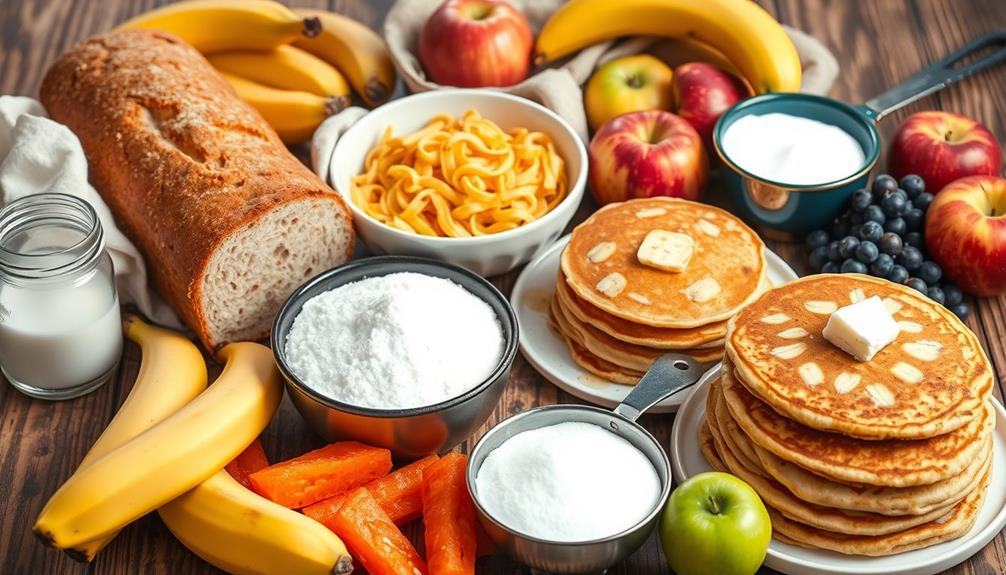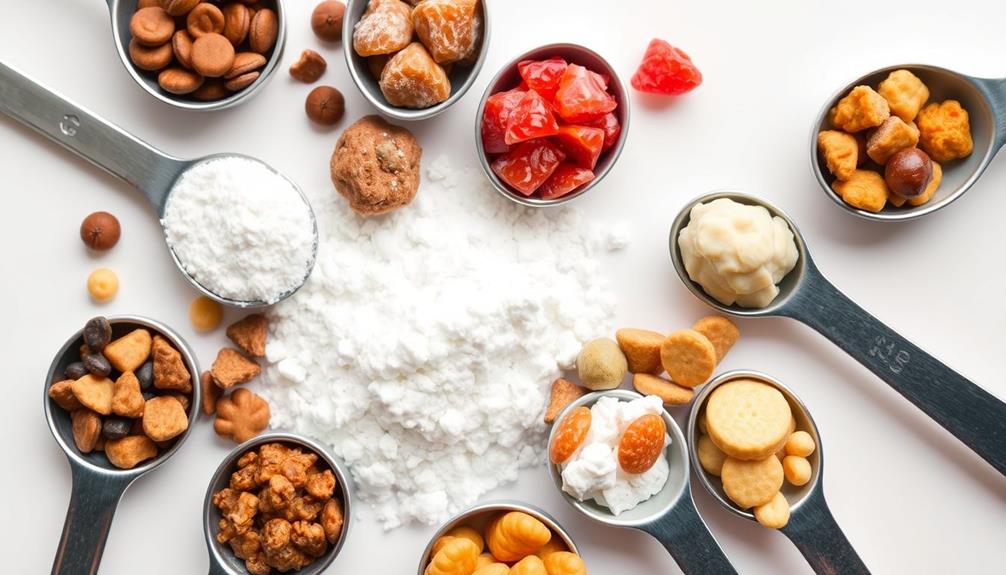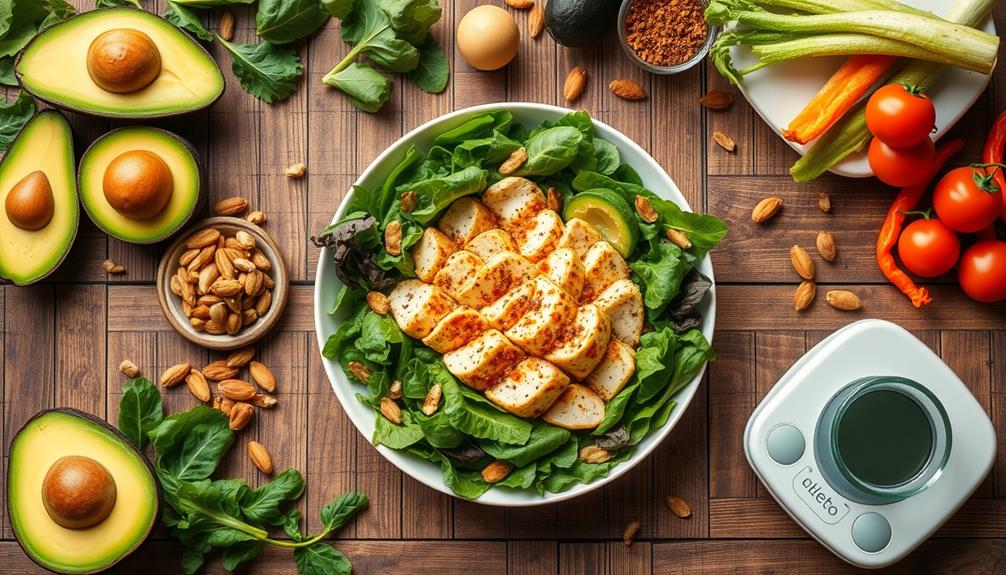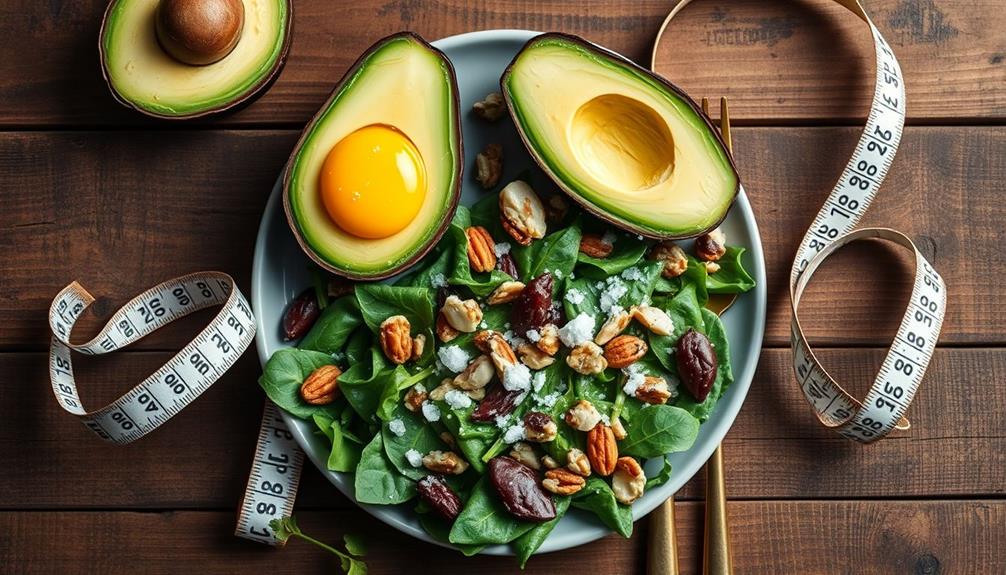To count net carbs on a keto diet, subtract dietary fiber and specific sugar alcohols from the total carbohydrates listed on nutrition labels. Use the formula: Net Carbs = Total Carbs – Fiber – (sugar alcohols if applicable). For example, if a food has 25g of total carbs, 10g of fiber, and 5g of sugar alcohols, it has 10g of net carbs. Aim for a daily limit of 20 to 50 grams of net carbs to maintain ketosis. Keeping track of these numbers makes it easier to stay on target while enjoying a variety of foods. You'll uncover more insights next.
Key Takeaways
- Net carbs are calculated by subtracting fiber and specific sugar alcohols from total carbohydrates.
- The recommended daily net carb limit for the keto diet is typically between 20 to 50 grams.
- Always check nutrition labels to differentiate between total carbs and net carbs.
- Use the formula: Net Carbs = Total Carbs – Fiber – (specific sugar alcohols) for accurate tracking.
- Incorporate low carb foods like fresh meats, non-starchy vegetables, and healthy fats to maintain ketosis.
Understanding Net Carbs

When you're diving into the keto diet, understanding net carbs is fundamental for your success. Net carbs are calculated by subtracting dietary fiber and certain sugar alcohols from total carbohydrates. This calculation gives you a clearer picture of the carbs that impact your blood sugar levels, which is essential for maintaining ketosis.
It's significant to note that balancing your diet with nutrient-rich foods, like those high in antioxidants, can support overall health while on the keto journey, as seen in juice diets.
On a typical keto diet, your daily net carb limit usually falls between 20 to 50 grams. This range can vary based on factors like your activity level and metabolic health.
It's critical to recognize that dietary fiber, while classified as a carbohydrate, doesn't count towards your net carbs. Since fiber is indigestible, it doesn't affect your blood sugar levels.
To effectively plan your meals and stick to the ketogenic diet, you need to grasp the difference between total carbohydrates and net carbs. Always read nutrition labels carefully, paying attention to the total carb count and adjusting for fiber and sugar alcohol content.
The Calculation Formula

To accurately track your net carbs, you need to understand the calculation formula. This method takes into account total carbs, fiber, and specific sugar alcohols, helping you see what truly affects your blood sugar levels.
Incorporating a balanced diet rich in whole foods can also support your overall health while on the keto diet, as highlighted in lifestyle for longevity.
Let's break down the calculation and look at some practical examples to make it clear.
Understanding Net Carbs
Calculating net carbs is essential for anyone following a ketogenic diet. To do this, you'll use the formula: Net Carbs = Total Carbs – Fiber – (specific sugar alcohols). Understanding this formula helps you identify which foods fit within your daily carb limit.
Fiber and certain sugar alcohols don't greatly impact blood sugar levels, making them important in your calculation. Additionally, it's important to be aware of the role of financial planning when managing your budget for groceries on a keto diet.
For instance, if a food item has 25g total carbs, 10g fiber, and 5g sugar alcohols, you'd calculate the net carbs as 10g (25g – 10g – 5g = 10g). This means that even though the item has a higher total carb count, its net impact on your ketosis is lower due to the fiber and sugar alcohols.
It's crucial to read nutrition labels carefully to find total carbohydrates, dietary fiber, and sugar alcohols. Foods rich in fiber can lower net carb counts, making them beneficial for your keto journey.
Calculation Method Explained
Understanding how to use the calculation formula for net carbs is essential for anyone on a keto diet. To calculate net carbs, you can use this simple formula: Net Carbs = Total Carbs – Fiber – (specific sugar alcohols). This calculation helps you determine the digestible carbohydrates that impact your blood sugar levels, similar to how one might assess investment options when rolling over to a Gold IRA.
For example, if a food item has 21g of total carbs, 8g of fiber, and 6g of sugar alcohols, you'd calculate net carbs as follows: 21g (total carbs) – 8g (fiber) – 3g (half of the sugar alcohols) = 10g net carbs. Remember, you only subtract half the amount of sugar alcohols, as their effect on blood sugar can vary.
Tracking your net carbs is vital for maintaining ketosis, with a recommended carbohydrate intake typically between 20-50 grams per day for those on a ketogenic diet.
You can easily calculate net carbs using nutrition labels, apps, or online calculators, which simplify the process. By accurately tracking your net carbs, you'll stay on top of your keto journey and reach your health goals effectively.
Practical Examples Provided
When you're looking at food labels, practical examples can make the process of calculating net carbs much clearer. To find net carbs, you'll use the formula: Net Carbs = Total Carbs – Fiber – (specific sugar alcohols).
Understanding the mechanics of brewing methods can help you make informed choices about your beverage options while on a keto diet.
For instance, let's say you're inspecting a snack that has 21g total carbs, 8g fiber, and 6g sugar alcohols. You'd calculate the net carbs like this: 21g – 8g – (6g/2) = 7g net carbs.
Now, consider another example with a food containing 13g total carbs, 9g fiber, 2g erythritol, and 1g allulose. Here, you'd do the calculation as follows: 13g – 9g – (2g/2) – (1g/2) = 1g net carbs.
Low Carb Food Examples

When you're on a keto diet, choosing low carb foods is key to staying on track. Fresh meats, non-starchy veggies, and certain dairy products offer great options that are low in net carbs.
Additionally, incorporating foods that help manage gout symptoms can be beneficial if you have concerns about uric acid levels.
Incorporating these foods into your meals can help you enjoy a variety of flavors while reaching your health goals.
Benefits of Low Carb
Low carb diets offer a multitude of benefits, especially through their food choices. By focusing on low carb options, you can maintain ketosis while enjoying a variety of delicious foods that support your health.
Additionally, embracing a curious mindset can enhance your journey on a keto diet, as it encourages you to explore new low carb recipes and food combinations that you mightn't have considered before.
Here are some key benefits of the keto diet that you'll appreciate:
- Reduced Hunger: Low carb foods, like fresh meats and leafy greens, keep you full longer, helping you avoid unnecessary snacking.
- Stable Energy Levels: With fewer net carbs, you'll experience more stable energy levels throughout the day, preventing those dreaded energy crashes.
- Nutrient-Dense Options: Foods like avocados and broccoli aren't only low in net carbs but are also packed with vitamins and minerals that support overall well-being.
- Healthy Fats: Incorporating healthy fats, such as those found in nuts and dairy, can improve brain function and promote heart health, all while keeping your net carb intake low.
Embracing the transformative power of curiosity can further enrich your understanding of these food options.
Examples of Low Carb Foods
In your journey towards a successful keto diet, incorporating a variety of low carb foods is essential for maintaining ketosis and overall health. By choosing foods with low net carbs, you can savor delicious options while keeping your carb intake in check.
Here's a quick reference table of some great low carb foods:
| Food Item | Net Carbs (per 100g) | Benefits |
|---|---|---|
| Chicken | 0 g | High protein, no carbs |
| Spinach | 1 g | Nutrient-rich, fiber source |
| Cheddar Cheese | 2.44 g | Healthy fats, protein source |
Adding these foods to your meals helps you stay within your carb limits. Avocados, for instance, contain about 1.83 g of net carbs per 100 g and are packed with heart-healthy fats. Nuts like Brazil nuts and flaxseeds also make excellent snacks, with low net carbs of 4.24 g and 1.58 g respectively.
Incorporating Low Carb Options
Incorporating a diverse range of low carb options into your meals can make a significant difference in your keto journey. By focusing on foods that are low in net carbs, you can enjoy satisfying meals while still staying on track.
Additionally, contemplate enhancing your wellness with natural remedies like essential oils, which can support overall health during your dietary changes, such as using essential oils for respiratory health.
Here are some excellent low carb foods to contemplate:
- Fresh Meats: Chicken and beef are both protein-rich options with 0 g net carbs, making them perfect for any meal.
- Non-Starchy Vegetables: Spinach (1.43 g net carbs per 100 g) and broccoli (4.04 g net carbs per 100 g) are nutrient-dense choices that won't derail your diet.
- Dairy Products: Cheddar cheese (2.44 g net carbs per 28 g) and Greek yogurt (3.98 g net carbs per 100 g) provide healthy fats and protein while keeping carbs low.
- Low Carb Fruits: Berries like raspberries (5.44 g net carbs per 100 g) and tomatoes (2.69 g net carbs per 100 g) can satisfy your sweet cravings without spiking your carb counts.
Including these low carb foods in your diet can help you maintain your energy levels and support your overall wellness on the keto diet.
High Carb Food Examples

When following a keto diet, you'll want to steer clear of several high-carb foods that can disrupt your progress. Starchy vegetables like potatoes and corn are prime examples, with total carbs clocking in at 16.17 g and 16.70 g, respectively. Consuming these can quickly add to your total carbs for the day.
To guarantee your furry friends stay healthy as well, it's important to understand their dietary needs, as seen in Ultimate Hamster Care Guide.
Fruits, especially bananas and apples, are also high in carbs, with bananas containing 20.24 g and apples 11.41 g of total carbs. Eating these in excess may push you out of ketosis.
Additionally, nuts like cashews and chickpeas should be avoided or consumed sparingly, as they've 24.97 g and 16.80 g of total carbs, respectively.
Grains, including rice and pasta, are major culprits for high carb intake and should be eliminated or replaced with low-carb alternatives.
Finally, processed foods often contain hidden sugars, leading to high total carb counts that can hinder ketosis. So, always check labels carefully to keep track of net carbs and maintain your keto goals.
Importance of Fiber

Counting net carbs effectively hinges on understanding the importance of fiber. Fiber is a type of carbohydrate that your body can't digest, which means it doesn't affect your blood sugar levels. When you're counting net carbs on a keto diet, you subtract the total fiber content from total carbohydrates to find the digestible carbs impacting ketosis.
Additionally, just like how environmental interactions shape individual growth, the types of fiber you consume can influence your overall health and digestion.
Here's why fiber is vital for your low-carb lifestyle:
- Aids Digestion: Fiber helps keep your digestive system running smoothly, preventing constipation. This is particularly important because issues like newborn constipation can arise if dietary fiber is inadequate.
- Promotes Satiety: A high-fiber diet makes you feel full longer, reducing the urge to snack on high-carb foods.
- Supports Cholesterol: Fiber can help maintain healthy cholesterol levels, essential for heart health.
- Rich Food Sources: Incorporate fiber-rich foods like leafy greens, avocados, and chia seeds into your meals for added nutrition.
Aim for the recommended daily fiber intake of around 25 grams for women and 38 grams for men.
Sugar Alcohols Explained

Fiber plays an essential role in your keto journey, but it's also important to understand sugar alcohols, which can enhance your low-carb lifestyle. Sugar alcohols are low-calorie sweeteners that replace sugar in various foods and beverages. Common examples include erythritol, xylitol, and maltitol, each impacting blood sugar levels differently.
Erythritol is a favorite among keto dieters because it has minimal effects on blood sugar and insulin levels, contributing only 0.2 calories per gram. On the other hand, xylitol, while low in calories, has a higher glycemic index, making it less ideal for strict keto adherence.
When calculating net carbs on your keto diet, you typically subtract half of the total sugar alcohol content from the total carbohydrates, as they aren't fully absorbed by your body.
However, be cautious with sugar alcohols like maltitol, which can lead to digestive issues if consumed in large amounts. Monitoring your individual tolerance is key to enjoying these sweeteners without negative effects.
Tracking Your Intake

To successfully navigate your keto journey, tracking your net carb intake is essential. By keeping an eye on your daily consumption, you can maintain ketosis and achieve your goals. Here's how to effectively track your intake:
- Read Nutrition Labels: Start by checking the total carbohydrate content on the nutrition label of each food item.
- Calculate Net Carbs: Use the formula: Net Carbs = Total Carbs – Fiber – (half of sugar alcohols). This simple calculation helps you determine how many net carbs you're actually consuming.
- Set Daily Goals: Aim to keep your net carb intake between 20 to 50 grams daily, depending on your individual tolerance and activity levels.
- Log Your Food: Consistently record everything you eat throughout the day. Each item contributes to your overall macronutrient intake, and logging helps you stay mindful of your choices.
Utilizing apps or online calculators can make this process easier, ensuring accuracy in your carb counting.
Tools and Resources

Effective tools and resources can considerably simplify your net carb tracking journey on the keto diet. Start by utilizing apps like the Wholesome Yum app, which lets you customize recipes and efficiently track net carbs, helping you stay aligned with your keto goals.
Printable keto cheat sheets can also be a game changer; they list common foods along with their total and net carb values, making meal planning much easier.
Online calculators are invaluable for accurately calculating net carbs. By inputting total carbs, fiber, and sugar alcohols, you can guarantee precise tracking.
Remember, regularly checking nutrition labels is vital. Always look for total carbohydrate content and practice subtracting fiber and sugar alcohols to calculate net carbs for each food item accurately.
Joining community forums or online groups focused on keto dieting can provide additional support. Sharing experiences and insights with others can enhance your understanding of managing net carb intake.
With these tools and resources at your disposal, you'll find it easier to navigate the keto diet while keeping your net carbs in check.
Frequently Asked Questions
How Do I Calculate Net Carbs on Keto?
To calculate net carbs, you subtract fiber and half of sugar alcohols from total carbs. Check nutrition labels carefully, and aim for 20-50 grams daily to stay within your keto goals. It's that simple!
How Many Net Carbs Will Kick You Out of Keto?
Exceeding 50 grams of net carbs in one day might kick you out of ketosis. Most people aim for 20-25 grams daily to maintain fat-burning processes and keep insulin levels stable for better results.
Should I Count Net Carbs or Total Carbs?
If you think counting total carbs is the Holy Grail, think again! You should definitely count net carbs instead. They're what really matter for keeping your body in ketosis and achieving your health goals.
Is Zero Net Carbs Really No Carbs?
"Zero net carbs" doesn't mean there are no carbs at all. You'll often find trace amounts. Always check labels carefully; some foods may have less than 1 gram, which can still affect your overall intake.
Conclusion
Counting net carbs on a keto diet is key to achieving your health goals. By focusing on fiber and understanding sugar alcohols, you can make informed choices. Many believe that all carbs are created equal, but the truth is that fiber and certain sugar alcohols don't impact your blood sugar like traditional carbs do. So, as you track your intake, remember that it's not just about the numbers but also about the quality of the carbs you consume.









